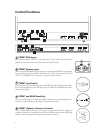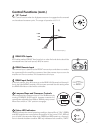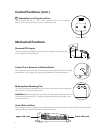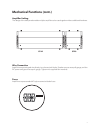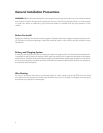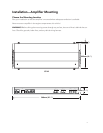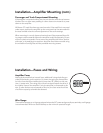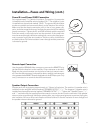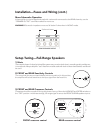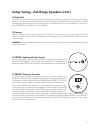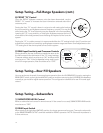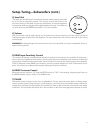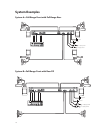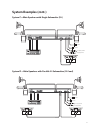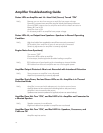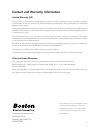
15
5) REAR Input Sensitivity Control
Turn controls all the way counterclockwise (minimum position). In this position, the amplifier will be less sen-
sitive to the input signal from the head unit. Slowly rotate this control clockwise until maximum undistorted
playing level is heard from the subwoofers. Listen closely for faults such as bottoming from the subwoofer.
If fault is detected, rotate REAR input sensitivity control counterclockwise until fault is eliminated. At this
point, the maximum undistorted subwoofer playing level has been defined.
6) REAR Crossover Control
Move the selector switch to “LP” and the FILTER switch to “ON.” In this setting, lowpass signal is sent to
the REAR speaker outputs. Select 12 or 24dB/octave.
7) PHASE
Subwoofer phase is relative to the front loudspeakers. Correct electrical phase does not always mean
correct acoustic phase. Swap positive (+) and negative (-) connections at the speaker outputs where the
subwoofer is connected to the amplifier. It is beneficial to listen to the subwoofer connected in both phase
conditions. The subwoofer should be left in the condition in which the strongest bass response is noted.
Setup Tuning—Subwoofers (cont.)
3) Head Unit
The head unit should have all controls such as bass, treble, balance, and fader
set to the flat or centered position. The volume control should be at the
minimum setting. If the head unit has any equalization or bass management
features such as boost, they should be deactivated at this time. Turn head unit
on, and verify that the GREEN status LED is lit on the amplifier.
4) Volume
With the chosen musical track playing, turn the head unit volume control up until the maximum level of
undistorted signal is heard from the speakers. For most head units, this will be at the end of the volume
control range.
WARNING! A distorted signal from the head unit sent to the amplifier can cause loudspeaker failure at
higher listening levels!



